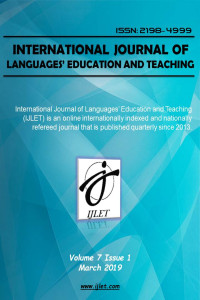An Investigation on the Sociolinguistic Competence of English Language Teacher Trainees: A Comparative Study on Native and Non-Native English Speakers
Öz
The aim of the present study was to investigate sociolinguistic abilities of Turkish senior students of
ELT departments in comparison to native speakers of English. Fifty Turkish and twenty-five
American students participated in the study. The study was carried out in two aspects: (1) The
differences of refusal and complaint strategies and (2) how their performances were perceived by a
native interlocutor for the same social situations with two variables of interlocutors: higher – equal,
familiar – unfamiliar. The data were collected qualitatively and quantitatively by means of two tools; a
DCT involving 6-paired situations with two interlocutors, in total 12 items, separated as 3 refusal and
3 complaint situations was used for the qualitative analysis. The responses of all participants for each
pair were coded, analysed and compared in SPSS program. Quantitative analysis was done by a
communicative rating scale. An American rater graded Turkish students’ responses according to the
5-point scale to assess their performances in sociocultural and sociolinguistic criteria. The results
showed that Turkish EFL learners could use a range of speech act strategies, but they deviate from
native speakers in content. Also, it was seen that they lacked some sociolinguistic and sociocultural
knowledge that might cause sociopragmatic failure.
Anahtar Kelimeler
Sociolinguistic competence speech acts complaints refusals discourse completion tasks
Kaynakça
- Akinci-Akkurt, P.(2007). A case study on assessing pragmatic awareness of turkish efl learners via speech act set of complaints: a cross-cultural pragmatic perspective. Unpublished Master’s Thesis. Gazi University, Ankara.
- Bardovi-Harlig, K.&Dörnyei, Z. (1998). Do language learners recognize pragmatic violations? pragmatic vs. grammatical awareness in instructed l2 learning. TESOL Quarterly. 32, 233–259
- Beebe, L. M., Takahashi, T., & Uliss-Weltz, R. (1990). Pragmatic transfer in ESL refusals. In R. C. Scarcella, E. Andersen, & S. D. Krashen (Eds.). Developing Communicative Competence in a Second Language (55-73). New York: Newbury House.
- Bikmen, A. S. (2011). A descriptive study on the performance of complaints by Turkish university students in an efl context. Unpublished Master’s Thesis. Bogazici Universitesi, Ankara
- Billmyer, K. (1990). "I really like your lifestyle": ESL learners learning how to compliment. Penn Working Papers in Educational Linguistics, 6(2), 31-48.
An Investigation on the Sociolinguistic Competence of English Language Teacher Trainees: A Comparative Study on Native and Non-Native English Speakers
Öz
Anahtar Kelimeler
Sociolinguistic competence speech acts complaints refusals discourse completion tasks
Kaynakça
- Akinci-Akkurt, P.(2007). A case study on assessing pragmatic awareness of turkish efl learners via speech act set of complaints: a cross-cultural pragmatic perspective. Unpublished Master’s Thesis. Gazi University, Ankara.
- Bardovi-Harlig, K.&Dörnyei, Z. (1998). Do language learners recognize pragmatic violations? pragmatic vs. grammatical awareness in instructed l2 learning. TESOL Quarterly. 32, 233–259
- Beebe, L. M., Takahashi, T., & Uliss-Weltz, R. (1990). Pragmatic transfer in ESL refusals. In R. C. Scarcella, E. Andersen, & S. D. Krashen (Eds.). Developing Communicative Competence in a Second Language (55-73). New York: Newbury House.
- Bikmen, A. S. (2011). A descriptive study on the performance of complaints by Turkish university students in an efl context. Unpublished Master’s Thesis. Bogazici Universitesi, Ankara
- Billmyer, K. (1990). "I really like your lifestyle": ESL learners learning how to compliment. Penn Working Papers in Educational Linguistics, 6(2), 31-48.
Ayrıntılar
| Birincil Dil | İngilizce |
|---|---|
| Konular | İkinci Bir Dil Olarak İngilizce |
| Bölüm | Araştırma Makalesi |
| Yazarlar | |
| Yayımlanma Tarihi | 30 Mart 2019 |
| Yayımlandığı Sayı | Yıl 2019 Cilt: 7 Sayı: 1 |


